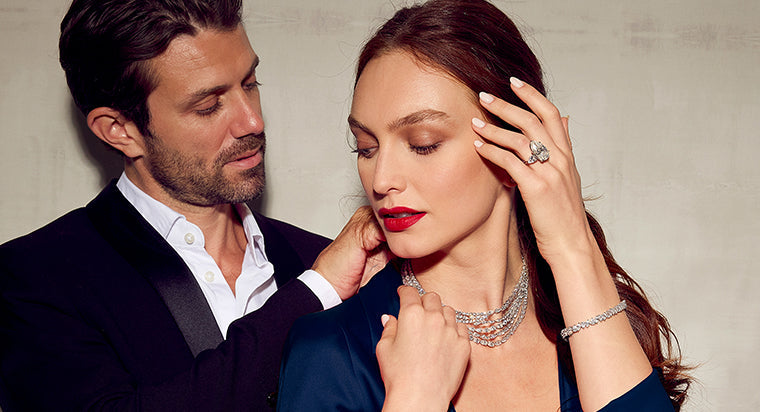How to Prevent Ear Piercing Infections

Earrings are some of the most commonly worn pieces of jewelry known to man. There are many reasons we love earrings, so much that we can endure the pain of new piercings.
When it comes to piercing, pain is not the only thing that people worry about. Ear infections from earrings are also a major source of concern.
TABLE OF CONTENTS
More than being a jewelry company that loves being part of amazing stories, we love to share helpful information.
This article highlights everything you need to know about earring piercing infections.
Without further ado, let's begin;
Symptoms of an infected ear piercing include:
- Swelling
- Redness
- Pain
- Tenderness
- Burning
- Itching
- Bleeding
- Yellow discharge
What are hypoallergenic earrings?
Hypoallergenic earrings generally refer to earrings less likely to cause an allergic reaction. However, there is no industry standard for jewelry makers to get the "hypoallergenic" label. It is not enough to assume that all earrings with the "hypoallergenic" tag won't cause an infection.
When you are earring shopping, it is best to focus on the earrings' materials and try different metals to give yourself a good idea of what suits your body.
What kind of earrings are recommended for sensitive ears?
Your skin may be allergic to some metal, don’t let that take the fun off wearing beautifully crafted earrings.
If you have sensitive ears, then we’ve got you covered with a range of hypoallergenic metals.
There are barely any general rules that apply to sensitive ears because it depends on the type of allergy and its severity. However, Nickel allergies are the most common kinds of allergies. Therefore, it is best to avoid it if you have sensitive skin.
Gold
Not all kinds of gold are equal. While some are coated with alloys such as Nickel (e.g., 14kt white gold), others are purer.
Your choice depends on how sensitive your skin is and how you react to base metals like copper, nickel, etc. You can find out through trial and error or consulting an allergist or dermatologist.
Yellow gold
If you love yellow gold, you should go for 18k or 19k gold. Both kinds have a higher percentage of pure gold (75%)
White gold
Lovers of white gold must note that it is only hypoallergenic when mixed with other metals asides from Nickel. White gold is made in both 14k and 18k. While 14k white gold is 58.3% gold, 18k white gold is 75% gold.
Platinum
At 95% pure platinum, this metal is the best option for anyone with very sensitive skin. It is highly durable as it can resist scratches and rust. Platinum can be properly paired with any gemstone and diamond you choose.
Also, it is a great option for earrings worn regularly and is the least likely to be hypoallergenic.
Tips to keep in mind to prevent earring infection
Not all piercings lead to infections. Keep it clean after a new piercing by regularly swapping the area with a saline solution. This helps to keep bacteria away and prevents infection.
Budget
Of course, you need to estimate how much you can afford before making a decision. If you are on a budget, it's best to look for brands that offer quality promise rings at different prices, like With Clarity.
Some tips to prevent infections;
- Keep the earring on until the piercing heals
- Clean new piercings twice a day
- Do not touch the ears with dirty hands
- Avoid pierced area(s) coming in contact with pools, rivers, lakes, or hot tubs before the wound heals
- Ensure that piercing equipment is sterilized and cleaned properly before use
Some tips for managing infections:
- Use a warm compress on the infected area
- You may need to see a healthcare professional for severe infections or take oral antibiotics
- Clean the infected area with a saline solution
These steps can also help in curing bacterial infection. However, if it doesn't heal in a few days, you may need to seek professional help.
ROUNDING UP
According to renowned American pop-star Jennifer Lopez,
"Women should never go without earrings. Passing on them is like an opportunity missed".
I bet anyone who has had earring infections may beg to differ. However, earring infections are preventable if you have access to the right information. This article right here is 'right information,' carefully written so you can easily understand it.
Summarily, nickel-free jewelry is the best option for anyone with sensitive skin.
Whether you are giving them out as a gift or getting one for yourself, it is critical to know what kind of earrings to buy.
FAQs
Can wearing fake earrings cause infection?
Non-surgical grade earrings may cause a skin reaction, especially in people with metal allergies. When your skin constantly comes across this kind of metal, it builds resistance to it.
This resistance is what may lead to irritation, swelling, or inflammation. In worse cases, it may result in injuries and infections.
How to get rid of earring infections?
To get rid of them, clean the infected earring holes with sterile saline. Also, avoid touching the area or anything that can cause bacterial presence.
What metal does not cause earring infection?
The best kind of jewelry is made from surgical steel, a variety of stainless steel. Other options include titanium, medical-grade plastic, platinum or surgical steel.
Which is the most hypoallergenic metal available?
The best hypoallergenic metals are those that are marked "nickel-free." So depending on your choice, you can choose nickel-free silver, gold, or platinum.









